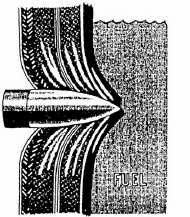When aircrews like those of the G4M Medium Bomber had to
worry about the safety of their planes, it quickly became of great concern for
military leaders. What good was to have hundreds of planes if none reached their
target? None, so engineers were responsible for making fuel tanks more
resistant to enemy gunfire.
While Japanese companies
like Mitsubishi Heavy Industries were hard at work in Japan, manufacturers were
hard at work in the United States, too.
.
One such engineer was George Murdock,
who had created one of the first ‘self-sealing fuel tanks’ in the United
States. The fuel tanks used alternating layers of rubber and man-made fabrics
surrounding a sealant made to ooze into bullet holes.
Soon, British planes, such as the Spitfire and Hurricane,
were also using this technology. However, these fuel tanks were heavier and
sometimes less efficient than the original fuel tanks, so planes like
the Japanese G4M Bomber went unprotected.
.
Throughout the war,
engineers improved designs for everything used in the war, whether it was
self-sealing fuel tanks, faster airplanes, or even “windproof, waterproof, and
foolproof” Zippo Lighters, which were issued to every man in the American Armed
Forces. Ironically, every Zippo lighter came with the guarantee that “Every Zippo
works, or we fix it for free.”



No comments:
Post a Comment